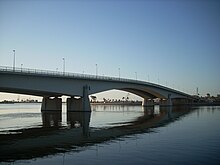
Giuliana Bridge is a box girder / haunched girder bridge constructed from prestressed concrete in Benghazi, Libya. [1] It has a three-span main structure which was originally built in the 1970s but was rehabilitated in 2005 by Bilfinger Berger. [2]

Giuliana Bridge is a box girder / haunched girder bridge constructed from prestressed concrete in Benghazi, Libya. [1] It has a three-span main structure which was originally built in the 1970s but was rehabilitated in 2005 by Bilfinger Berger. [2]

Benghazi is the second-most-populous city in Libya as well as the largest city in Cyrenaica, with an estimated population of 1,207,250 in 2020. Located on the Gulf of Sidra in the Mediterranean, Benghazi is also a major seaport.

Libya was a colony of Fascist Italy located in North Africa, in what is now modern Libya, between 1934 and 1943. It was formed from the unification of the colonies of Cyrenaica and Tripolitania, which had been Italian possessions since 1911.
A health care crisis currently exists in Libya due to the ongoing conflict.

Italian Libyans are Libyan-born citizens who are fully or partially of Italian descent, whose ancestors were Italians who emigrated to Libya during the Italian diaspora, or Italian-born people in Libya. Most of the Italians moved to Libya during the Italian colonial period.
Rugby union in Libya is a minor but growing sport.
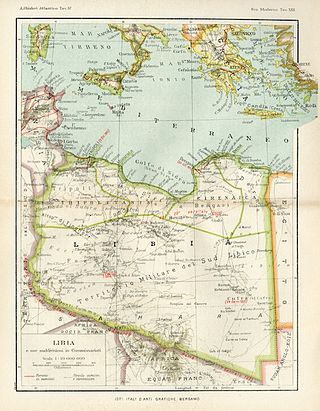
Benghazi Province, or Provincia di Bengasi in Italian, was one of the provinces of Libya under Italian rule. It was established in 1937.
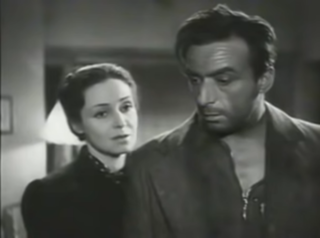
Bengasi is a 1942 Italian war film directed by Augusto Genina and starring Fosco Giachetti, Maria von Tasnady and Amedeo Nazzari. The film was shot at Cinecittà in Rome. The film was a propaganda work, designed to support the Fascist regime of Benito Mussolini. It portrays Allied atrocities in "Bengasi Italiana", such as the murder of a peasant by a group of drunken Australian soldiers.
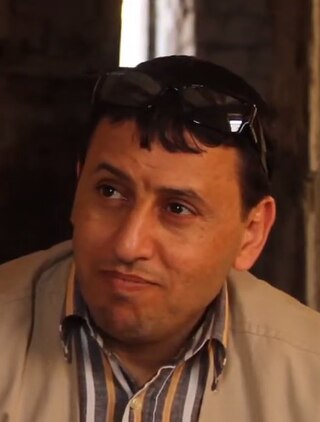
Fathi Terbil, also romanized as Fatih Turbel, is a Libyan lawyer and human rights activist and member of the National Transitional Council representing Libyan youth. He represents the relatives of over 1,000 prisoners killed by Libyan security forces in Abu Salim Prison in 1996. He is also the Youth and Sports Minister for the Interim Government.

The First Battle of Benghazi occurred as part of the Libyan Civil War between army units and militiamen loyal to Libyan leader Muammar Gaddafi and anti-Gaddafi forces in February 2011. The battle mainly took place in Benghazi, the second-largest city in Libya, with related clashes occurring in the nearby Cyrenaican cities of Bayda and Derna. In Benghazi itself most of the fighting occurred during a siege of the government-controlled Katiba compound.

The anti-Gaddafi forces, also known as the Libyan opposition or Libyan rebels, were Libyan groups that opposed and militarily defeated the government of Muammar Gaddafi during the First Libyan Civil War in 2011, killing him in the process. The Anti-Gaddafi forces were represented by the National Transitional Council and their National Liberation Army, which claimed to be the "only legitimate body representing the people of Libya and the Libyan state". These opposition forces included organized and armed militia groups, participants in the Libyan Civil War, Libyan diplomats who switched their allegiance from the Gaddafi-led government, and Libyan military units that switched sides to support the protesters.

The National Transitional Council (NTC) was a transitional government established in the 2011 Libyan civil war. The rebel forces overthrew the Libyan Arab Jamahiriya of Muammar Gaddafi. The NTC governed Libya for a period of ten months after the end of the war, holding elections to a General National Congress on 7 July 2012, and handing power to the newly elected assembly on 8 August.

The Second Battle of Benghazi took place during the Libyan Civil War between army units and militiamen loyal to Libyan leader Muammar Gaddafi, and anti-Gaddafi forces in Benghazi. The battle marked the start of a United Nations-mandated military intervention in the conflict, with fighter jets from the French Air Force attacking and destroying several pro-Gaddafi units, forcing them to retreat.
Mohamed "Mo" Nabbous was a Libyan information technologist, blogger, businessperson and civilian journalist who created and founded Libya Alhurra TV.

By the end of February 2011, medical supplies, fuel and food were dangerously low in Libya. On 25 February, the International Committee of the Red Cross launched an emergency appeal for US$6,400,000 to meet the emergency needs of people affected by the violent unrest in Libya. On 2 March, the ICRC's director general reminded everyone taking part in the violence that health workers must be allowed to do their jobs safely.

The 2012 Benghazi attack was a coordinated attack against two United States government facilities in Benghazi, Libya, by members of the Islamic militant group Ansar al-Sharia.
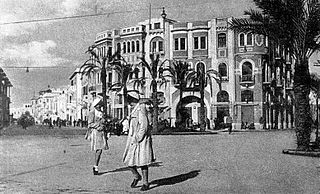
Italian Benghazi was the name used during the Italian colonization of Libya for the port-city of Benghazi in Italian Cyrenaica.
The Battle of Benina Airport was a battle of the Second Libyan Civil War which lasted from August 2014 until October 2014 between the Islamic Shura Council of Benghazi Revolutionaries supported by extremist fundamental groups such as Ansar al-Sharia, who attempted to capture the airport, and the Libyan National Army led by General Khalifa Haftar.
The following is a timeline of the history of the city of Benghazi, Libya.
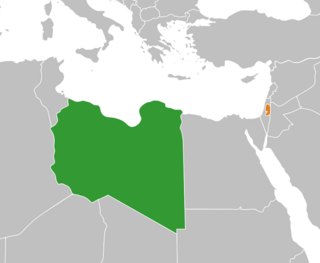
Libya–Palestine relations are bilateral relations between the Libya and State of Palestine. Palestine has an embassy in Tripoli and a consulate in Benghazi. Both countries are members of the Arab League, the Organisation of Islamic Cooperation, and the Non-Aligned Movement.